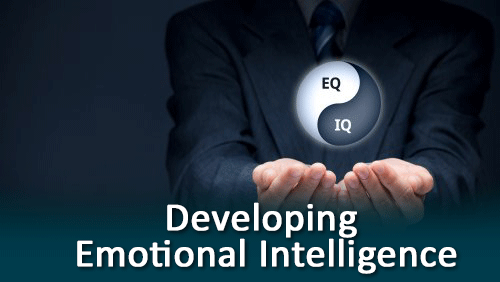Emotional Intelligence: In Sales
I. Introduction
Emotional intelligence is THE crucial aspect of sales success.
When you have emotional intelligence, you are better equipped to understand their customers' needs, build strong relationships, and close more deals.
In this extraordinary blog post, we will provide an in-depth exploration of high emotional intelligence (EI) in sales. We will define emotional intelligence, explore the psychology of a successful sales professional with high EI, explain its importance in sales, and provide practical tips and strategies for developing emotional intelligence.
EI is a set of skills that enable individuals to understand and manage their own emotions, as well as the emotions of others.
Sales professionals who possess emotional intelligence can understand their own emotions and behavior, manage their emotions in a constructive way, recognize and understand the emotions of others, and establish and MAINTAIN healthy relationships.
EI is critical to sales success. Sales professionals who possess emotional intelligence are better equipped to build strong relationships with their customers, understand their customers' needs and desires, and provide solutions that meet those needs.
Emotional intelligence also plays a critical role in sales negotiations. Sales professionals who possess emotional intelligence can understand the emotions of the other party, such as underlying fears and concerns, and use that knowledge to come up with solutions that are mutually beneficial. With high EI, sales professionals can detect feelings and emotions that aren't initially present and take a trained eye to notice.
On the other hand, sales professionals who lack emotional intelligence WILL struggle to build strong relationships, they WILL come across as untrustworthy, and they WILL have difficulty closing deals. Therefore, developing emotional intelligence is essential for success.
The purpose of this blog post is to provide sales professionals with a complete understanding of EI along with practical tips and strategies for developing and improving emotional intelligence. Treat this as an emotional intelligence guide for the sales professional, if you will.
We're dealing with emotions here, and they are not simple. Quite the opposite, they're very complex and have a unique way of understanding and interpreting for different people, depending (it always depends on...) on the group or individual at that moment in time.
We will explore each component of emotional intelligence in depth, provide examples of how emotional intelligence can be applied in sales, and offer actionable steps that sales professionals can take to develop their emotional intelligence.
By the end of this blog post, sales professionals will have a deeper understanding of emotional intelligence and how to apply it to their sales practice, ultimately leading to increased success in their careers.
More - Emotional Intelligence: In Marketing
II. Understanding Emotional Intelligence in Sales
In this section, we will provide a comprehensive understanding of emotional intelligence in sales, including its four main components, the importance of empathy in creating strong brand connections with customers, and real-life examples of successful sales professionals who have leveraged emotional intelligence to drive sales success.
What is Emotional Intelligence in Sales?
Emotional intelligence in sales refers to the ability of sales professionals to recognize and understand their own emotions and the emotions of others, and to use that understanding to build strong relationships with customers and close more deals.
EI consists of four main components: self-awareness, self-management, social awareness, and relationship management. In addition, motivation, empathy, and social skills are also important aspects of emotional intelligence in sales.
1. Self-awareness is the ability to recognize and understand one's own emotions and how they impact behavior. Self-awareness involves recognizing one's own strengths and weaknesses, understanding how emotions impact behavior, and being able to adjust behavior accordingly.
2. Self-management is the ability to manage one's own emotions in a constructive way, such as controlling impulsive behavior. Self-management involves controlling impulsive behavior, managing stress and anxiety, and staying focused on goals.
3. Social awareness is the ability to recognize and understand the emotions of others (such as their fears and concerns) and knowing how to respond appropriately by establishing rapport and building trust.
4. Relationship management is the ability to establish and maintain healthy relationships with others, including the ability to communicate effectively and resolve conflicts.
Sales professionals who possess these four components of emotional intelligence are better equipped to handle objections, build trust with customers, and close more deals.
EI also helps sales professionals to better understand customer needs and to provide solutions that meet those needs.
The psychology of sales professionals who possess emotional intelligence typically have a few key psychological traits in common, such as high levels of resilience, empathy, and adaptability.
These traits enable them to better understand and connect with customers, anticipate customer needs, and provide solutions that meet those needs.
Motivation: These sales professionals are often highly motivated and driven to succeed. They maintain a positive attitude, persist in the face of rejection or setbacks, and are self-motivated to achieve their goals.
Sales professionals who possess emotional intelligence are typically more self-aware and able to manage their emotions in a constructive way, leading to better communication and stronger relationships with customers.
Explanation of How Emotions Influence Consumer Behavior:
Emotions play a critical role in consumer behavior. Customers make buying decisions based on emotions, such as the desire for status, the need for security, or the desire for convenience. Sales professionals who understand how emotions impact consumer behavior can tailor their sales approach to meet those emotional needs, leading to increased sales success.
Empathy is a key component of emotional intelligence in sales. Sales professionals who demonstrate empathy and understanding towards their customers are more likely to establish a strong brand connection and build long-term relationships. This connection can lead to increased customer loyalty and repeat business.
There are plenty of examples of successful sales professionals who have leveraged emotional intelligence to drive sales success.
For example, Jeff Bezos, the founder of Amazon, is known for his customer-centric approach to business, which is rooted in empathy and a deep understanding of customer needs.
Jeff Bezos' customer-centric business model is based on the belief that putting the customer first is the key to long-term success. He believes that by focusing on the customer experience and providing the best possible service, a business can earn the loyalty of its customers and build a sustainable competitive advantage. To achieve this, Bezos has designed Amazon's business model around a few key principles: - Customer Obsession: Amazon puts the customer at the center of everything it does. The company focuses on providing the best possible customer experience, from fast and reliable shipping to outstanding customer service. - Continuous Innovation: Amazon is constantly experimenting and innovating to find new ways to improve the customer experience. This has led to the development of products like Amazon Prime, which offers free two-day shipping and other benefits, as well as services like Amazon Web Services (AWS), which provides cloud computing services to businesses. - Operational Excellence: Amazon is known for its rigorous focus on operational excellence. The company uses data and analytics to optimize its operations, from inventory management to logistics, to ensure that it can deliver products to customers quickly and efficiently. Regarding emotional intelligence, Bezos has demonstrated his ability to empathize with his customers' needs and desires. He has been able to understand and anticipate what customers want before they even realize it themselves and has used this insight to develop new products and services that meet their needs. Bezos has also shown emotional intelligence in his leadership style, inspiring and motivating his team to deliver the best possible customer experience. He has been able to build a culture of innovation and customer-centricity at Amazon, which has helped the company to stay ahead of its competitors. Jeff Bezos' customer-centric business model and his use of EI have been critical to Amazon's success, making it one of the most customer-focused and innovative companies in the world.
Another example is Tony Robbins, a well-known motivational speaker and sales trainer, who emphasizes the importance of emotional intelligence in sales and teaches sales professionals how to develop this skill set.
Tony Robbins is a well-known motivational speaker, life coach, and business strategist who has helped millions of people around the world. He is a master at emotional intelligence and uses it extensively in sales. Here are some specific examples of how Tony Robbins applies emotional intelligence in sales: - Building rapport: Tony Robbins understands the importance of building rapport with potential clients. He makes an effort to connect with them on a personal level, showing genuine interest in their lives and concerns. For example, during a sales pitch, he might ask about the prospect's family, hobbies, or interests before discussing the product or service. - Active listening: Tony Robbins also employs active listening skills to better understand the prospect's needs and desires. He pays close attention to what the person is saying, making eye contact, and nodding to show he's engaged. By doing so, he can tailor his sales pitch to address the prospect's specific pain points and goals. - Empathy: In sales, empathy is essential to understanding the prospect's emotions and motivations. Tony Robbins uses his own experiences and stories to help prospects feel understood and heard. He might say, for example, "I know how frustrating it can be to feel stuck in a job you hate. Let me tell you how our product can help you find more fulfilling work." - Persuasion: Tony Robbins is a master of persuasion (he's actually called himself a master communicator), using emotional intelligence to influence people in a positive way. He knows how to tap into people's emotions, desires, and fears to motivate them to take action. For instance, he might use fear of missing out (FOMO) to encourage prospects to act quickly or use positive emotions such as joy, happiness, and excitement to create a desire for the product. - Emotional management: Finally, Tony Robbins is skilled at managing his own emotions and those of his prospects during the sales process. He knows how to stay calm and focused, even in high-pressure situations, and uses his emotional intelligence to diffuse tension and build trust. For example, he might use humor or a light-hearted approach to lighten the mood during a tense negotiation. Overall, Tony Robbins applies EI by building rapport, active listening, showing empathy, using persuasion, and managing emotions. By doing so, he can connect with prospects on a deeper level, understand their needs and motivations, and help them make informed decisions that lead to positive outcomes.
Building Stronger Relationships with Customers:
EI is critical in building stronger relationships with customers.
Sales professionals who are able to empathize with customers and to understand their needs are more likely to establish a rapport and build trust. This trust leads to increased customer loyalty and repeat business, which is essential for long-term success.
Emotional intelligence enables sales professionals to communicate more effectively with customers, by using language and tone that is empathetic and relevant. They are able to listen actively to customer needs and preferences, and to respond in a way that meets those needs. This leads to better customer satisfaction and increased sales success.
Possessing high emotional intelligence is better to handle objections and conflicts, by responding in a way that is empathetic and understanding. These sales professionals are able to anticipate potential objections and to respond in a way that builds trust and strengthens the relationship. This leads to a more positive outcome and increased sales success.
Increased Sales Performance and Productivity:
Emotional intelligence is closely tied to sales performance and productivity. Sales professionals who possess emotional intelligence are more likely to close deals, to generate repeat business, and to maintain a positive attitude in the face of rejection or setbacks. They are also more motivated to succeed and to achieve their goals, which leads to increased sales performance and productivity.
EI is a critical skill set for sales professionals. By understanding and leveraging the four components of emotional intelligence, sales professionals can build stronger relationships with customers, communicate more effectively, handle objections and conflicts, and ultimately increase sales performance and productivity. EI is crucial for a successful sales career.
III. Developing Emotional Intelligence in Sales
Developing Emotional Intelligence in sales is a crucial aspect of professional growth for sales professionals who want to improve their sales performance, build stronger customer relationships, and establish a more successful sales career.
While Emotional Intelligence is a complex skill that involves a range of cognitive and emotional abilities, there are several tips and strategies that can be employed to enhance self-awareness, self-regulation, empathy, and social skills.
Improving Self-Awareness, Self-Regulation, and Motivation:
1. Self-awareness is an essential skill for sales professionals to develop because it enables them to understand their emotions, motivations, and behavior in different situations.
It helps them to identify their strengths and weaknesses, enabling them to make better decisions, communicate more effectively, and build stronger relationships with their clients.
To enhance self-awareness, sales professionals should focus on identifying their emotional triggers, strengths, and weaknesses.
Emotional triggers are events or situations that can elicit a strong emotional response in an individual. For example, if a salesperson is rejected by a potential client, they may experience feelings of frustration, disappointment, or even anger.
By recognizing their emotional triggers, sales professionals can develop strategies to manage their emotions better and avoid impulsive reactions. Sales professionals should also identify their strengths and weaknesses. Strengths are areas where an individual excels and can leverage to achieve success. For example, a salesperson may have excellent communication skills that enable them to build rapport with clients easily.
On the other hand, weaknesses are areas where an individual may struggle or require additional support to achieve their goals. For example, a salesperson may struggle with time management, leading to missed deadlines or appointments.
By identifying their strengths and weaknesses, sales professionals can develop strategies to leverage their strengths while improving areas where they struggle. Example: a salesperson who struggles with time management may benefit from setting clear priorities, creating a schedule, or delegating tasks to other team members.
2. Self-regulation is an essential skill for sales professionals to develop because it enables them to manage their emotions, thoughts, and behaviors effectively.
It helps them to stay focused and perform at their best in high-pressure situations.
To improve self-regulation, sales professionals should work on managing their emotional responses, being more adaptable and flexible, and learning to stay calm and focused in high-pressure situations. One of the critical aspects of self-regulation is managing emotional responses. Sales professionals may encounter stressful situations that can trigger negative emotions like frustration, anger, or anxiety.
However, responding impulsively to these emotions can harm the salesperson's relationship with the client and hinder their performance. Instead, sales professionals should learn to manage their emotions by recognizing their triggers and developing strategies to respond in a more productive and constructive way. Being adaptable and flexible is another critical aspect of self-regulation. Sales professionals may encounter situations that require them to adjust their approach, communication style, or even product/service offering to meet the client's needs. Being open to change and willing to adapt can help sales professionals build stronger relationships with their clients and increase their chances of success. Learning to stay calm and focused in high-pressure situations is essential for sales professionals. They may encounter stressful situations like difficult negotiations, tight deadlines, or aggressive clients.
Staying calm and focused can help sales professionals think clearly, make rational decisions, and maintain a professional demeanor.
Techniques like deep breathing, mindfulness, and visualization can help sales professionals stay calm and focused under pressure.
3. To enhance motivation, sales professionals should set realistic goals, focus on the positive aspects of their work, and maintain a positive outlook.
Goals provide direction and purpose, giving sales professionals a clear target to work towards. Setting unrealistic goals can lead to frustration and disappointment, which can demotivate sales professionals.
Sales professionals should set goals that are challenging but achievable, based on their current skillset and available resources.
Maintaining a positive outlook is also essential for enhancing motivation. Sales professionals should focus on the positive aspects of their work, such as the satisfaction of helping clients achieve their goals or the excitement of closing a deal.
Positive thinking can help sales professionals overcome setbacks and stay motivated, even during difficult times. It can also help them maintain a positive attitude towards their work, which can improve their relationships with clients and colleagues. Focusing on personal growth and development can enhance motivation for sales professionals. Continuously learning new skills, techniques, and strategies can help sales professionals feel more confident and competent in their work. It can also increase their value to their organization and help them achieve their long-term career goals. Finally, sales professionals should maintain a healthy work-life balance to enhance motivation. Balancing work and personal life can help sales professionals avoid burnout and maintain their energy and enthusiasm for their work. This can involve setting boundaries, prioritizing self-care activities, and seeking support from colleagues, friends, or family.
To develop empathy and social skills, sales professionals should focus on active listening, building rapport, and developing an understanding of their customers' needs and preferences. This involves asking open-ended questions, being attentive to non-verbal cues, and demonstrating genuine interest in the customer's perspective. Additionally, sales professionals should work on building trust, showing empathy, and establishing a positive emotional connection with their customers.
To maintain and improve EI in Sales, it is essential for sales professionals to engage in ongoing personal and professional development. This includes attending training sessions, seeking feedback from mentors and colleagues, reading relevant literature, and staying up to date with the latest trends and developments in the industry.
Challenges and Limitations of Applying EI in Sales:
There are several challenges and limitations associated with applying Emotional Intelligence in Sales, including resistance from customers, time constraints, and difficulty in measuring results. Some sales professionals may struggle to develop empathy or regulate their emotions, leading to ineffective communication and decreased sales performance.
To overcome these challenges and limitations, sales professionals should focus on building their Emotional Intelligence skills by building their resilience, adapting to new situations, and seeking feedback from others.
Improving Emotional Intelligence in Sales: The Guide:
To improve Emotional Intelligence in Sales, sales professionals should employ several practical strategies, including the classics: active listening, empathy, mindfulness, and storytelling.
1. Active listening is an essential component of emotional intelligence in sales. It involves more than just hearing the words a customer says; it requires being fully present and attentive, both physically and mentally. Active listening requires a conscious effort to focus on the customer's words, tone, and body language, as well as the emotions they are expressing.
One key aspect of active listening is asking relevant questions. This not only helps sales professionals understand the customer's needs and preferences, but it also shows the customer that the sales professional is genuinely interested in helping them find the best solution.
Asking open-ended questions, rather than closed-ended questions that can be answered with a simple "yes" or "no," can encourage the customer to provide more detailed and insightful responses.
Another important aspect of active listening is demonstrating genuine interest in the customer's perspective. This means acknowledging and validating their feelings, concerns, and needs. It also involves refraining from interrupting or talking over the customer, and instead allowing them to express themselves fully.
When customers feel heard and understood, they are more likely to trust the sales professional and be receptive to their recommendations.
Incorporating active listening into sales strategies can have a profound impact on sales performance. It can help sales professionals build stronger relationships with customers, enhance their ability to identify and respond to customer needs, and increase customer satisfaction and loyalty.
To improve active listening skills, sales professionals can engage in training programs and workshops, practice mindfulness and other relaxation techniques to improve focus, and seek feedback from customers and colleagues.
It's also important to continually reflect on and evaluate communication skills and strategies to identify areas for improvement.
2. Empathy is the ability to understand and share the feelings of others.
In sales, empathy is critical in building strong relationships with customers and creating a sense of trust and understanding.
Empathetic sales professionals are able to put themselves in the customer's shoes and understand their needs, concerns, and emotions.
One way to demonstrate empathy in sales is by actively listening to customers, asking relevant questions, and acknowledging their feelings and concerns. This not only helps the sales professional understand the customer's needs and preferences but also shows the customer that they are being heard and valued.
Another way to show empathy in sales is by showing genuine interest and concern for the customer's well-being. Sales professionals who demonstrate empathy are more likely to build a lasting relationship with their customers, which can lead to repeat business and referrals.
Incorporating empathy into sales strategies can have a significant impact on sales performance.
Customers are more likely to trust sales professionals who show empathy and are more likely to be receptive to their recommendations.
Empathetic sales professionals are also better equipped to identify and respond to customer needs, which can result in increased customer satisfaction and loyalty.
To develop empathy skills, sales professionals can practice active listening when engaging in conversations, and seek feedback from customers and colleagues.
It's also important to continually reflect on and evaluate communication skills and strategies to identify areas for improvement. By developing empathy skills and incorporating them into sales strategies, sales professionals can enhance their emotional intelligence and ultimately achieve greater success in their sales roles.
3. Mindfulness is the practice of being present in the moment, regulating one's emotions, and staying focused on the task at hand.
In sales, mindfulness is essential for managing stress, improving concentration, and making better decisions.
It can help sales professionals stay calm and focused during high-pressure situations, such as a challenging negotiation or a difficult customer interaction.
Mindfulness involves being aware of one's thoughts, feelings, and bodily sensations without judgment.
By practicing mindfulness, sales professionals can learn to regulate their emotions and respond more effectively to challenges and obstacles. They can also improve their ability to listen actively and communicate more clearly with customers.
One way to incorporate mindfulness into sales strategies is by practicing breathing exercises or meditation techniques before and after customer interactions. This can help sales professionals stay focused and centered during the interaction, as well as reflect on what worked well and what could be improved afterward.
It's also important to take breaks throughout the day to recharge and refocus, rather than pushing through fatigue and stress.
Another way to practice mindfulness in sales is by setting realistic goals and prioritizing tasks based on their importance and urgency. This can help sales professionals stay organized and focused, rather than getting overwhelmed by a long to-do list.
By incorporating mindfulness into sales strategies, sales professionals can enhance their emotional intelligence and ultimately achieve greater success in their roles.
They can develop a better understanding of their own thoughts and emotions, as well as those of their customers, which can lead to improved communication, stronger relationships, and increased sales performance
4. Storytelling is an essential skill that all sales professionals should possess.
It is a powerful tool that can be used to build rapport, establish a positive emotional connection with customers, and ultimately close more sales.
Finally, we will explore the benefits of storytelling in sales and how sales professionals can use this technique to improve their emotional intelligence.
One of the primary benefits of storytelling is that it can help customers see the value of a product or service in a more tangible and relatable way.
Sales professionals who are skilled at storytelling can share personal anecdotes and examples that demonstrate how the product or service has helped them or others. By doing so, they can create an emotional connection with the customer, making it easier to close the sale.
Storytelling can also be used to overcome objections or concerns that customers may have about a product or service. By sharing stories of other customers who had similar concerns but were ultimately satisfied with the product, sales professionals can help alleviate doubts and build trust with the customer. This technique can be especially effective when dealing with skeptical or hesitant customers.
To use storytelling effectively, sales professionals must first understand their customer's needs and concerns. By doing so, they can tailor their stories to address these specific points and demonstrate how the product or service can meet those needs.
It's essential to keep the stories concise and relevant, as too much information can become overwhelming and detract from the overall message.
Sales professionals who are skilled at storytelling can also use this technique to differentiate themselves from competitors and establish a unique selling proposition.
By sharing stories that highlight their expertise and experience, they can demonstrate why they are the best choice for the customer. This technique can be especially effective in highly competitive markets.
Storytelling is a powerful tool that sales professionals can use to build rapport, establish emotional connections with customers, and ultimately close more sales. By mastering this technique and developing other emotional intelligence skills, sales professionals can improve their overall effectiveness and achieve greater success in their roles.
IV. Conclusion
And here we are. The end of the article. We hope you have a clear understanding of emotional intelligence how to master it, and how to apply it for a successful sales career.
When it comes to successful sales professionals and emotional intelligence, the two are inseparable.
Understanding the four components of EI, developing self-awareness, self-management, social awareness, and relationship management, and applying strategies such as active listening, empathy, mindfulness, and storytelling can help sales professionals build stronger relationships with their customers, improve communication, and increase sales performance and productivity.
While applying emotional intelligence in sales may have challenges and limitations, ongoing personal and professional development can help overcome these challenges and enhance EI in sales.
By incorporating emotional intelligence into sales strategies, sales professionals can create a positive emotional connection with their customers and establish a strong brand connection, leading to long-term success in their sales careers.
P.S. - Dennis Reynolds is a master of emotional intelligence (sometimes) and here at TheMoneWaffle we are HUGE 'Always Sunny' fans with plans of future articles centered around sales and marketing and how the relate to the show. Get ready, this will be extraordinary.






Comments
Post a Comment